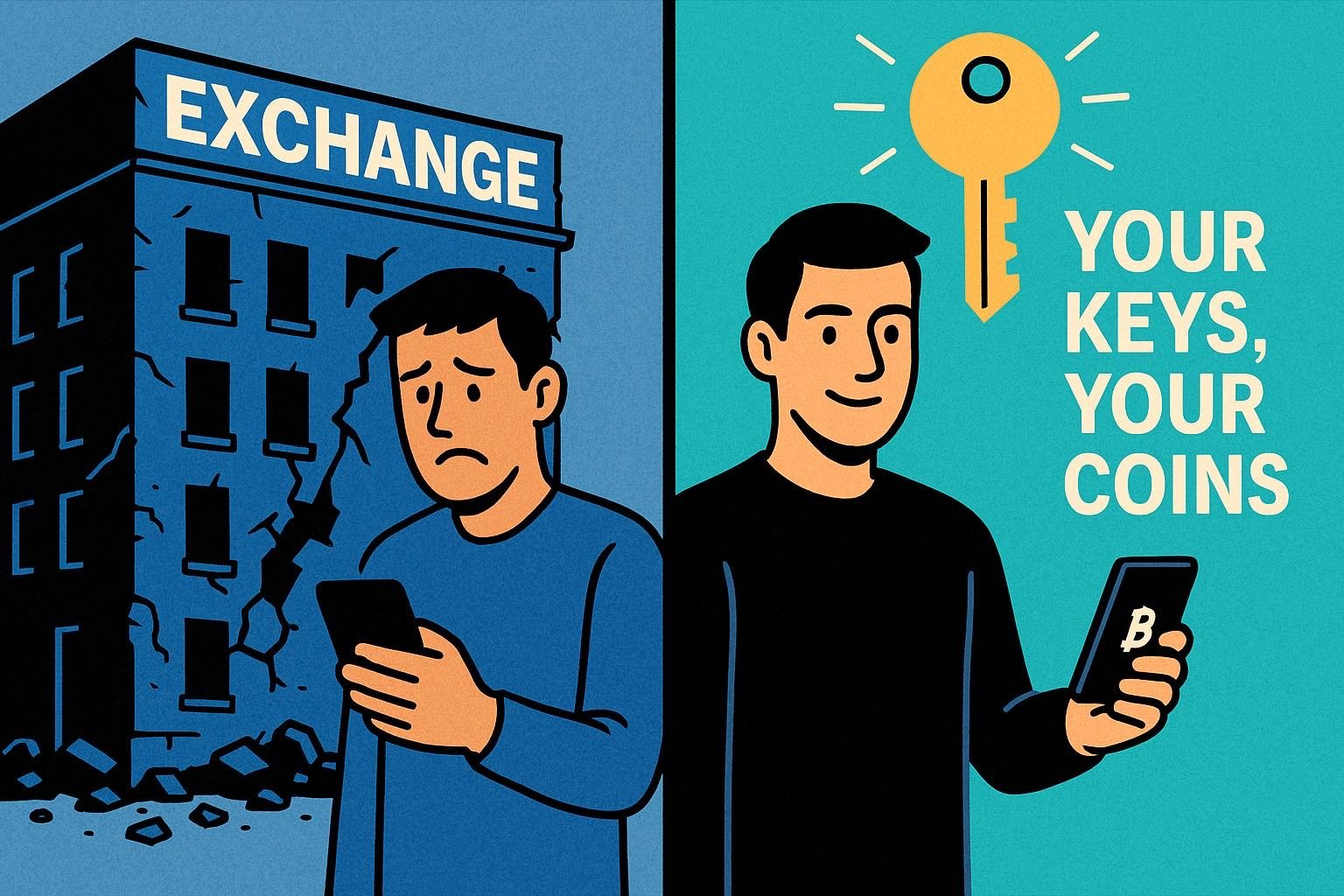Paul Grewal, Chief Legal Officer at Coinbase, doesn’t mince words. In just one sentence, he distilled one of the core tensions in crypto, the difference between holding your own keys and entrusting them to someone else.
Put simply, it’s the difference between ownership and dependency, between being in full control versus relying on a third party to do the right thing.
For a space built on decentralization, this divide is foundational, leaving many investors wondering how they should safely store their crypto and the best Bitcoin wallet to use.
What Is Self-Custody?
Self-custody simply means that you hold the private keys to your own assets. Whether it’s Bitcoin, stablecoins, NFTs, or ERC-20 tokens, no one can move your funds without your explicit signature.
You’re not subject to withdrawal freezes, or exchange hacks.
It’s empowering, but it also requires discipline, education, and awareness of the risks. A misplaced seed phrase or compromised device can mean irreversible loss. That’s exactly why many believers in self-custody adore top Bitcoin wallet brands that deliver full financial freedom without compromising on security.
What Are Custodial Services?
Custodial services, on the other hand, offer convenience and familiarity. They handle security on your behalf, simplify onboarding, and often integrate with other financial services.
But they also introduce third party risk. As the history of crypto has shown, centralized custody solutions, whether exchanges, platforms, or apps, are not immune to failure, mismanagement, or regulatory intervention.
Just last month, CoinDCX froze withdrawals due to a cyberattack, and BigONE suffered a $27 million hack, both reminding users that trusting third parties can carry sudden and worrying consequences.
The Shift Toward Accountability
Grewal’s comment comes at a time when regulatory clarity around self-custody is gaining traction.
U.S. initiatives like the SEC’s “Project Crypto” and renewed focus on digital asset frameworks suggest a growing recognition of self-custody.
For seasoned crypto users, it signals a potential alignment between public policy and core crypto principles. For newer users, it’s a reminder that how you custody your assets is just as important as what you invest in.
There’s a temptation to think of self-custody purely in terms of security: avoiding hacks, avoiding scams, staying off centralized platforms. But it’s also about values. It’s about agency, accountability, and understanding the tools you’re using.
When you hold your own keys, you’re no longer outsourcing the responsibility of managing your assets. You become your own bank. That’s not a role everyone wants to play, but it’s one that many in the crypto community believe should at least be available to everyone.
As Grewal puts it, the distinction really shouldn’t be that hard. Self-custody is the boundary line between depending on others and depending on yourself.
And while it may not be easy for everyone, it’s a distinction that lies at the heart of what makes crypto different.
Top Bitcoin Wallet
If you’re ready to take control of your crypto, choosing the right self-custody wallet is the next step. Among the most popular options available today is Best Wallet, a top Bitcoin wallet renowned for its security-first design and feature-rich ecosystem.
Endorsed by leading publications including the New York Post and Money, Best Wallet remains a solid choice for anyone hunting for a personal Bitcoin wallet that offers full control and better protection amid growing centralized risks.
At its core, Best Wallet allows investors from around the world to securely store, buy, swap, and trade their BTC holdings without asking for personal details, eliminating the data risks associated with centralized exchanges.
That explains its soaring popularity among both newcomers and veteran investors who prefer to stay off the radar while exploring the abundant opportunities in the world of crypto trading.
Best Wallet’s no-KYC policy is complemented by an extremely strong security system as well. Unlike other top Bitcoin wallet brands in the self-custody market segment, Best Wallet doesn’t put the full burden of security on the user. It has already partnered Fireblocks, a respected name in crypto security, to provide insurance services on all assets held in its facility, without sacrificing accessibility.
The wallet goes further by introducing two-factor authentication, thorough private key encryption, as well as biometric options like fingerprint scans to prevent unauthorized access to user funds.
Beyond its robust security system, Best Wallet also turns heads with a suite of cutting-edge features, including fiat payments, staking perks, cross-chain swaps, portfolio management, low fees, and most notably, its token launchpad.
Several crypto YouTubers, including ClayBro have also featured the wallet, dubbing it as a top Bitcoin wallet option, especially for those who prefer a perfect balance of self-custody, privacy, and functionality.
Download Best Wallet
This article has been provided by one of our commercial partners and does not reflect Cryptonomist’s opinion. Please be aware our commercial partners may use affiliate programs to generate revenues through the links on this article.
